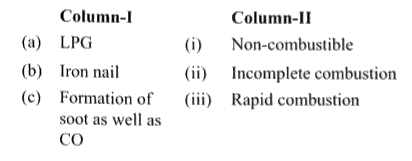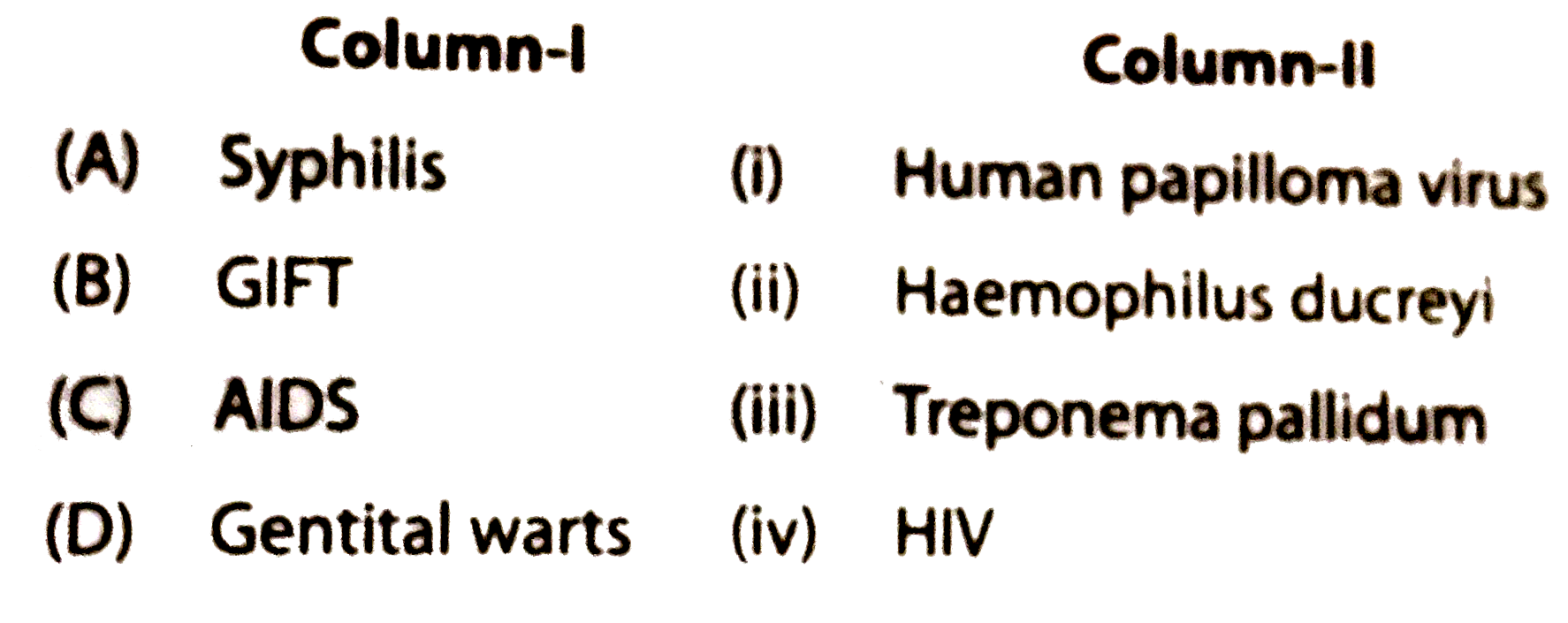Match the Column-I whit Column-II and select the correct option from the codes given below.
(Column-I) (A)Humerus (B)Hydrostatic skeleton (C)Femur
(Column-II) (i)Thigh (ii)Upper arm (iii)Flatworms (iv)Acetabulum (v)Glenoid cavity (vi)Hydra
A-(ii),(v),B-(iii),(vi),C-(i),(iv)
A-(ii),(iv),B-(iii),(vi),C-(i),(v)
A-(i),(v),B-(ii),(iv),C-(iii),(vi)
A-(iii),(vi),B-(i),(v),C-(ii),(iv)
The correct Answer is:A
To solve the matching question, we will analyze each item in Column-I and find its corresponding match in Column-II.
1. Identify the first item in Column-I: Humerus
- The humerus is the bone located in the upper arm.
- From Column-II, the option that corresponds to the upper arm is (ii) Upper arm.
- Therefore, we match (A) Humerus → (ii) Upper arm.
2. Identify the second item in Column-I: Hydrostatic skeleton
- A hydrostatic skeleton is a type of skeleton found in certain animals, where the body shape is maintained by fluid pressure.
- The organisms that have a hydrostatic skeleton include (iii) Flatworms and (vi) Hydra.
- Thus, we match (B) Hydrostatic skeleton → (iii) Flatworms and (vi) Hydra.
3. Identify the third item in Column-I: Femur
- The femur is known as the thigh bone in humans and other vertebrates.
- The corresponding option in Column-II is (i) Thigh.
- Therefore, we match (C) Femur → (i) Thigh.
4. Confirming other options in Column-II:
- The remaining options in Column-II are (iv) Acetabulum and (v) Glenoid cavity which do not directly match with any of the items in Column-I.
- The acetabulum is a part of the hip joint, and the glenoid cavity is part of the shoulder joint, but they are not directly related to the items in Column-I.
Final Matches:
- (A) Humerus → (ii) Upper arm
- (B) Hydrostatic skeleton → (iii) Flatworms and (vi) Hydra
- (C) Femur → (i) Thigh
Conclusion:
Based on the matches, the correct option is:
- (A) → (ii), (B) → (iii) and (vi), (C) → (i).
- The humerus is the bone located in the upper arm.
- From Column-II, the option that corresponds to the upper arm is (ii) Upper arm.
- Therefore, we match (A) Humerus → (ii) Upper arm.
- A hydrostatic skeleton is a type of skeleton found in certain animals, where the body shape is maintained by fluid pressure.
- The organisms that have a hydrostatic skeleton include (iii) Flatworms and (vi) Hydra.
- Thus, we match (B) Hydrostatic skeleton → (iii) Flatworms and (vi) Hydra.
- The femur is known as the thigh bone in humans and other vertebrates.
- The corresponding option in Column-II is (i) Thigh.
- Therefore, we match (C) Femur → (i) Thigh.
- The remaining options in Column-II are (iv) Acetabulum and (v) Glenoid cavity which do not directly match with any of the items in Column-I.
- The acetabulum is a part of the hip joint, and the glenoid cavity is part of the shoulder joint, but they are not directly related to the items in Column-I.
- (A) Humerus → (ii) Upper arm
- (B) Hydrostatic skeleton → (iii) Flatworms and (vi) Hydra
- (C) Femur → (i) Thigh
Based on the matches, the correct option is:
- (A) → (ii), (B) → (iii) and (vi), (C) → (i).
Similar Questions
Knowledge Check
Match the Column I with Column II and select the correct option from the codes given below.
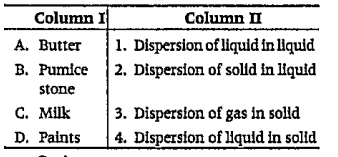 AA - (i), B - (ii), C-(iii), D - (iv)BA - (iv), B - (i), C-(ii), D- (iii)CA - (iv), B - (iii), C-(ii), D- (i)DA - (iii), B - (iv), C-(i), D - (ii)
AA - (i), B - (ii), C-(iii), D - (iv)BA - (iv), B - (i), C-(ii), D- (iii)CA - (iv), B - (iii), C-(ii), D- (i)DA - (iii), B - (iv), C-(i), D - (ii)Match the Column I with Column II and select the correct option from the codes given below.
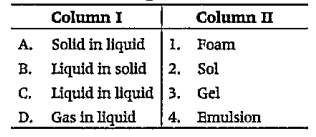 AA - (i), B - (ii), C-(iii), D - (iv)BA - (iv), B - (i), C-(ii), D- (iii)CA - (iv), B - (iii), C-(ii), D- (i)DA - (iii), B - (iv), C-(i), D - (ii)
AA - (i), B - (ii), C-(iii), D - (iv)BA - (iv), B - (i), C-(ii), D- (iii)CA - (iv), B - (iii), C-(ii), D- (i)DA - (iii), B - (iv), C-(i), D - (ii)Match the column-I with column-II and select the correct option from the codes given below.
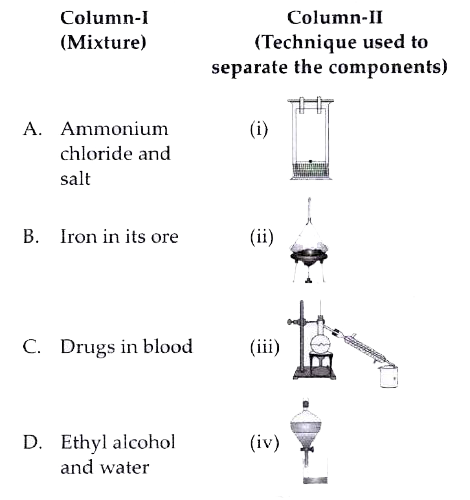 A(A)-(i), (B)-(iii), (C)-(ii), (D)-(iv)B(A)-(ii), (B)-(iv), (C)-(i), (D)-(iii)C(A)-(ii), (B)-(iii), (C)-(iv), (D)-(i)D(A)-(iii), (B)-(ii), (C)-(i), (D)-(iv)
A(A)-(i), (B)-(iii), (C)-(ii), (D)-(iv)B(A)-(ii), (B)-(iv), (C)-(i), (D)-(iii)C(A)-(ii), (B)-(iii), (C)-(iv), (D)-(i)D(A)-(iii), (B)-(ii), (C)-(i), (D)-(iv)
Match Column-I with Column-II and select the correct option from the codes given below.
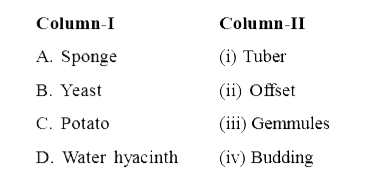
View SolutionMatch the column I with column II and select the correct option from the codes given below
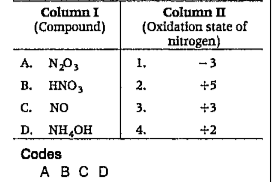
View SolutionMatch the columns-I with column II and select the correct option from the codes given below.
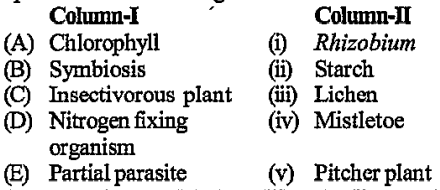
View SolutionMatch the column I with column II and select the correct option from the codes given below.

View SolutionMatch the column I with column II and select the correct option from the codes given below.
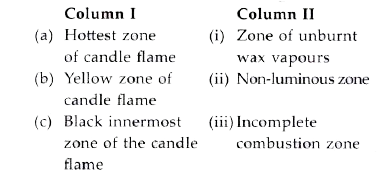
View Solution

